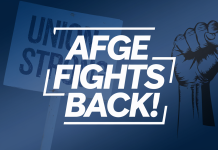AFGE Local 17 President Douglas Massey last week testified before a congressional committee, detailing issues that impede the work of attorneys who adjudicate veterans’ claims and making recommendations on how to improve the process and better serve veterans.
Speaking before House Committee on Veterans’ Affairs Subcommittee on Disability Assistance and Memorial Affairs (DAMA), Massey, who represents approximately 1,000 attorneys and additional support staff at the Board of Veterans’ Appeals, told lawmakers that recent leadership changes have resulted in turmoil arising from decisions made by a leadership team who lacks veterans law experience.
The decisions they made include downgrading the career path for attorneys, appointing Veterans Law Judges (VLJs) lacking any experience in veterans law, providing insufficient training and support for professional staff, and imposing unrealistic quotas for the attorneys.
“Regrettably, recent leadership changes at the Board have introduced challenges within the organization, contributing to demoralization among our dedicated employees, with some considering leaving,” Massey testified. “This confluence of factors has created a chaotic work environment, negatively impacting the effectiveness of the Board’s operations, to the detriment of the veterans we serve.”
Downgrading the attorney career path
For many decades, the board has had a GS-14 career path for attorneys. But two years ago, board leadership downgraded the career path to GS-13, which does not help the VA’s and this subcommittee’s goal of recruitment and retention of talent. Instead of trying to narrow the pay gap between attorneys in the public and private sector, the VA has effectively lowered the salary cap for VA attorneys and worsened the problem.
Inexperienced Veterans Law Judges
The decision to hire VLJs without any veterans law experience is disruptive and detrimental to the board’s mission. For example, there’s a big difference in decision output between inexperienced VLJs and their seasoned counterparts. From October 2021 to June 2022, inexperienced VLJs issued an average of one to six decisions per week, while VLJs with seven or more years of experience issued between 13 and 26 decisions weekly.
In addition to fewer decisions, attorneys complain that the inexperienced VLJs struggle with approving quality decisions, requiring that attorneys train the VLJs for whom they work.
Many of the board’s experienced VLJs are now tasked with training their new inexperienced colleagues, which detracts from time they could devote to signing or finalizing decisions. The hiring of inexperienced VLJs has also demoralized attorneys because it has foreclosed promotion opportunities to these coveted positions.
Inadequate training
The board has also failed to provide sufficient training and support to new and experienced attorneys because of management’s singular focus on the overall output.
The lack of training at the board has been so severe that VLJs have reached out to the union for assistance. For the benefit of veterans in its care, Local 17 has tried to fill the training gap left by management by initiating a special program aimed at providing tools, support, and efficiency strategies to ensure the success of decision-writing attorneys. The local has offered individualized assistance and training to an average of 50 attorneys per year. While upper management has taken notice of the local’s successful initiative, there has been no effort whatsoever to institute a similar program on their part.
There has also been chaos following the passage of the PACT Act, which expands VA health care and benefits for veterans exposed to toxic burn pits during their military service. The PACT Act introduced substantial changes to veterans law, but board attorneys and VLJs are only required to have two hours of training on this complex law. The employees feel they are ill-equipped to understand the nuances of this statute, significantly increasing the risk of errors and inadequate decisions for veterans seeking their rightfully earned benefits.
Unreasonable quotas and work metrics
AFGE members are not afraid of the hard work necessary to satisfy the mission of serving veterans, but extraordinarily challenging metrics make it more difficult to meet standards, setting attorneys up for failure or forcing them to cut corners in order to meet their production goals.
The board has made significant changes over the past several years regarding the number of cases and issues a board attorney must complete annually. Before the Appeals Modernization Act (AMA) became law in 2017, attorneys were expected to complete 125 cases a year regardless of the number of issues decided. In FY2018, the board increased its production standards from 125 cases to 169 cases a year.
In FY 2019, the board created an alternative measure or track of production which evaluated the total number of issues decided by an attorney, regardless of the number of cases completed, setting that number at 510 issues decided.
In FY 2020, while the case quota remained at 169, the issue quota was raised to 566. In FY 2021, the quota was changed to a more manageable but still very difficult 156 cases or 491 issues. This has remained the same through FY 2024.
AFGE strongly urges the board to lower the quota to allow sufficient time for required review of claims and to continue to hire more attorneys to meet the increased production goal. Our union also urges the committee to request a Government Accountability Office study on the production standards of board attorneys to determine what is feasible while retaining high quality standards.
“AFGE truly fears that if the current quota remains, many hardworking and successful attorneys will continue to leave the Board either from overwork, inability to meet the quota, or discomfort with being forced to cut corners,” Massey told lawmakers.





